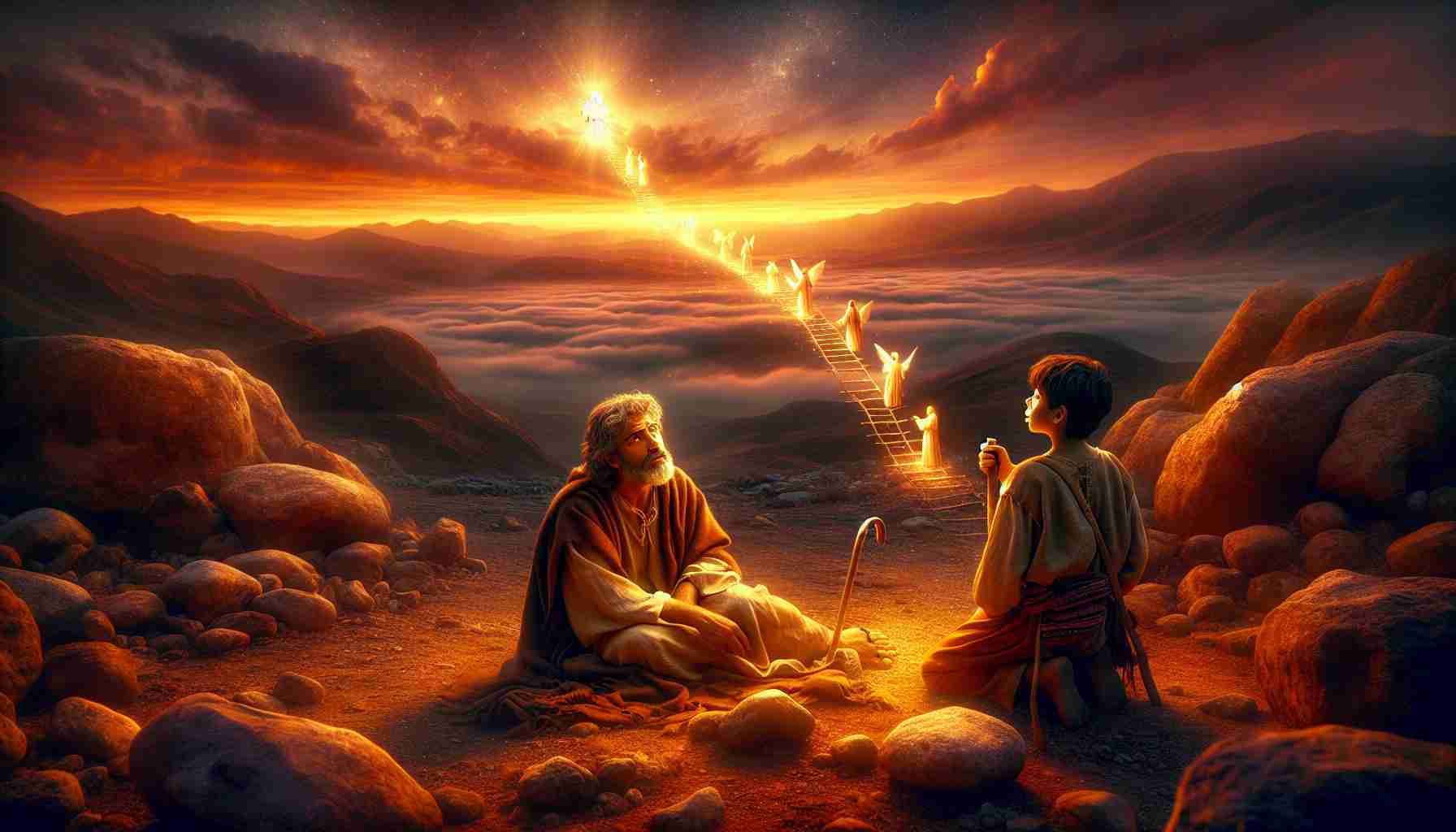

My name is Eliav, and I was the servant who packed Yaakov’s last bundle before he left Be’er Sheva. You won’t find me in any scroll, but I was there the day he walked alone into the wilderness, his father Isaac’s blessings echoing behind him like wind through olive trees.
Yaakov had just deceived his father to receive the blessing meant for his brother Esav. The air around our tents was thick with tension. Rivka, his mother, had pulled me aside and whispered, "He'll have to go. Far away. Until Esav’s anger passes." So I helped fold cloaks, roll up bread, and tuck dried dates into a cloth bag. As we tied the last knot, Yaakov lifted his eyes to the hills and nodded once. That’s how he left—heavy-hearted, yet dignified.
Days passed, and I couldn’t stop wondering about him. Did he find shelter that first night? Did he feel afraid, knowing he was somewhere between home and exile?
Years later, I met him again.
Lavan—Yaakov’s uncle and my new master—had sent me to gather wood near the fields outside Charan, the city in Mesopotamia where we lived. I saw a figure crouched by a low fire, staring at the flames. As I drew close, I recognized the slant of his shoulders and his hands—calloused now, but careful, precise.
“Eliav,” he murmured, his voice low.
“Master Yaakov,” I said, bowing low.
He looked nothing like the boy who had left. Still, something about his eyes held that same quiet searching.
As we talked, he told me about the night he had fled—how he had laid his head on a stone and fallen into a dream so powerful it made his heart tremble.
He spoke of a ladder planted on earth, with its top reaching the heavens. Angels—messengers of God—were going up and down the ladder. And above it all, God stood and said, “I am the God of Abraham your father and the God of Isaac. The land where you lie, I will give to your children.”
As he spoke, I felt my skin chill.
“You saw this?” I asked.
He nodded. “That night, I thought I was alone. I thought I was far from holiness. But when I awoke, I said, ‘Surely God is in this place, and I did not know it.’”
He leaned closer to the fire, quiet again.
That moment stayed with me for the rest of my life: how a man weighed down by guilt and fear could find hope in a dream and begin again. Yaakov realized that his journey wasn’t a punishment—it was part of something bigger. God didn’t appear to him because he was perfect. God appeared to him because he was ready to grow.
I left the woods that night not just carrying wood but a memory of what it felt like to recognize that even in a lonely place, God does not abandon us.
Even the wilderness is sacred ground.
My name is Eliav, and I was the servant who packed Yaakov’s last bundle before he left Be’er Sheva. You won’t find me in any scroll, but I was there the day he walked alone into the wilderness, his father Isaac’s blessings echoing behind him like wind through olive trees.
Yaakov had just deceived his father to receive the blessing meant for his brother Esav. The air around our tents was thick with tension. Rivka, his mother, had pulled me aside and whispered, "He'll have to go. Far away. Until Esav’s anger passes." So I helped fold cloaks, roll up bread, and tuck dried dates into a cloth bag. As we tied the last knot, Yaakov lifted his eyes to the hills and nodded once. That’s how he left—heavy-hearted, yet dignified.
Days passed, and I couldn’t stop wondering about him. Did he find shelter that first night? Did he feel afraid, knowing he was somewhere between home and exile?
Years later, I met him again.
Lavan—Yaakov’s uncle and my new master—had sent me to gather wood near the fields outside Charan, the city in Mesopotamia where we lived. I saw a figure crouched by a low fire, staring at the flames. As I drew close, I recognized the slant of his shoulders and his hands—calloused now, but careful, precise.
“Eliav,” he murmured, his voice low.
“Master Yaakov,” I said, bowing low.
He looked nothing like the boy who had left. Still, something about his eyes held that same quiet searching.
As we talked, he told me about the night he had fled—how he had laid his head on a stone and fallen into a dream so powerful it made his heart tremble.
He spoke of a ladder planted on earth, with its top reaching the heavens. Angels—messengers of God—were going up and down the ladder. And above it all, God stood and said, “I am the God of Abraham your father and the God of Isaac. The land where you lie, I will give to your children.”
As he spoke, I felt my skin chill.
“You saw this?” I asked.
He nodded. “That night, I thought I was alone. I thought I was far from holiness. But when I awoke, I said, ‘Surely God is in this place, and I did not know it.’”
He leaned closer to the fire, quiet again.
That moment stayed with me for the rest of my life: how a man weighed down by guilt and fear could find hope in a dream and begin again. Yaakov realized that his journey wasn’t a punishment—it was part of something bigger. God didn’t appear to him because he was perfect. God appeared to him because he was ready to grow.
I left the woods that night not just carrying wood but a memory of what it felt like to recognize that even in a lonely place, God does not abandon us.
Even the wilderness is sacred ground.